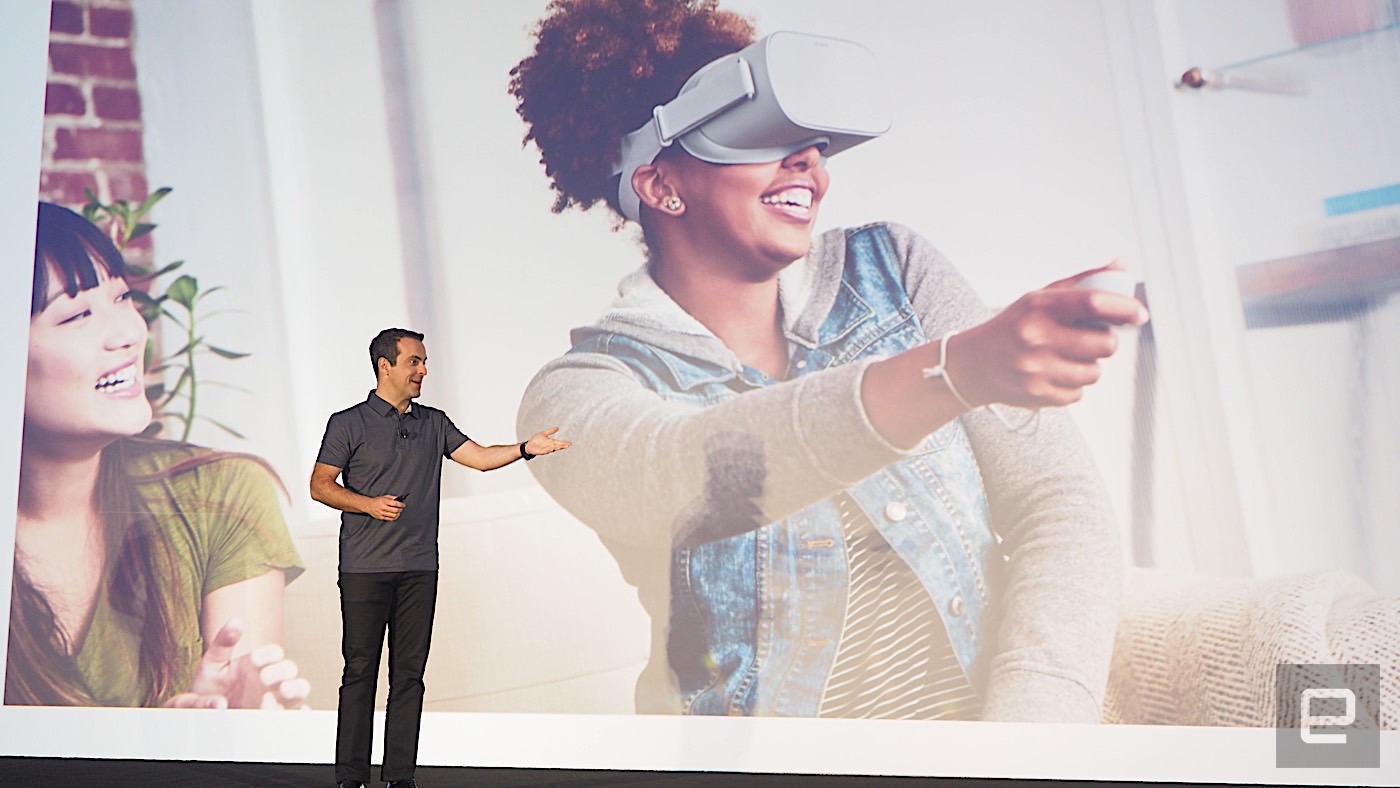Facebook's Hugo Barra says standalone headsets are key to social VR

Even though Oculus didn't have an official presence at CES this year, its leader, Hugo Barra, made a surprise appearance at Qualcomm's press conference to make an important announcement: Xiaomi would be its global hardware partner for Oculus Go, its first standalone VR headset. What's more, Xiaomi would also be making a special variant of the Go, the Mi VR Standalone, especially for China. In an interview with Barra following the press conference, he explained the reason for the push in standalone headsets: social VR.
"This is a product category that will help us bring the most number of people into VR and really start unlocking these opportunities for social presence," said Barra. "It's the idea of having a completely self-contained product that you can just put on and start using it. You can do everything in one step."
"Everything is integrated together in one device," he continued. "That is the best experience that we think can be created."
When Facebook CEO Mark Zuckerberg stood on stage at last year's Oculus Connect and said that he wants to bring VR to a billion people, he really meant it. And a key reason for doing so is not just to sell hardware or games -- although that's obviously a pretty good incentive as well -- but it's to further Facebook's agenda of connecting the world via social VR.
"The vision that we have is for VR to enable people to spend time together and to do things together that they otherwise wouldn't be able to," said Barra. "It could be something as simple as Facebook Spaces, where you get in a place together with your avatars and interact. But it could also be watching something together, or playing a game together or doing any number of things together."
"And, of course, the more people we have in VR, the more people are going to start spending time together [in VR]. Which brings us back to why standalone VR is a huge focus for us."
In 2016, Oculus first showed off Project Santa Cruz, a prototype of its higher-end standalone headset, to a select group of reporters. But last year, it announced that it was working on a lower-end and much more affordable version of it called the Oculus Go. It'll be priced at just $199, and importantly, it's the product that Facebook hopes will drive the VR category to the masses.
The other part of Oculus' quest to spread VR to as many people as possible is its new partnership with Xiaomi. "[Xiaomi] is a very exciting, innovative company," said Barra of his former employer. But more important, he said, Xiaomi has a history of making high-quality products at very affordable prices. Also, while the Mi Standalone VR does share the same core features as the Oculus Go, Barra said there are aspects to its hardware and, more importantly, its software, that makes it highly localized to the Chinese market.
"It was very important for us to work with a partner who could bring a lot of leadership and expertise about the Chinese market," he added. "It's a market that is very important for us because we want to bring VR into as many hands as possible."
There's certainly evidence to suggest China's importance in the VR industry. According to a Canalys report, China accounted for 40 percent of VR shipments in 2016, while an IDC report suggests that China is on pace to become the world's largest market for virtual- and augmented-reality headsets by 2020. This is in part due to China's billion-plus consumer base, but also the rapid growth of VR-related startups in the country in recent years.
Facebook isn't the only company investing in standalone VR. Google, for example, unveiled a standalone Daydream headset, the Lenovo Mirage Solo, at CES. The Mirage Solo sets itself apart from the Oculus Go with Google's WorldSense technology, which gives it six degrees of freedom and positional tracking without external cameras or sensors. But the Mirage Solo is also tentatively priced at around $300, which is $100 more than the Oculus Go.
Barra doesn't seem worried about the competition. "We pride ourselves first and foremost on being the leaders in VR," he said. "We've been doing this for a very long time. We have a pretty high degree of confidence that the Oculus VR experience is the best, by a wide margin, from anything else you see out there."
Facebook's heavy investment in standalone headsets doesn't mean that it's giving up PC or mobile-based VR. "Standalone is the newest one, and is obviously one that we're really excited about," said Barra. Mobile VR is still very important, because it's the lowest barrier to entry, while the Rift offers the highest-quality VR. "We believe in all three," he said.
But in the end, Barra believes that standalone headsets are the future. It will be, he says, the easiest way to get people to use VR. "The Oculus Go will be our most successful VR product on the market," he said. Whether or not that will ultimately lead to mass social VR adoption, however, remains unclear.
Click here to catch up on the latest news from CES 2018.
via Engadget RSS Feed "http://ift.tt/2rbiaWn"
Comments
Post a Comment